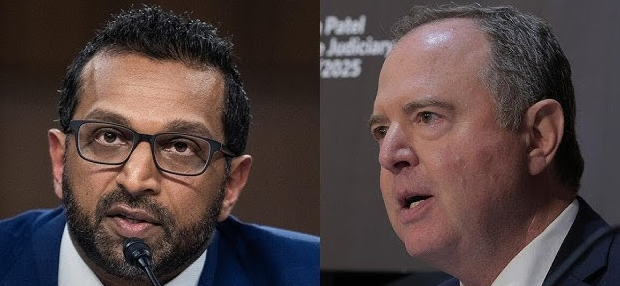Best Free Resources for Traders in 2025: From Charts to AI Alerts
December 01 , 2025

In a fiery Senate hearing, FBI Director Kash Patel and Senator Adam Schiff exchanged sharp insults over the handling of the Epstein-Maxwell case and agent firings. Here’s what unfolded, major takeaways, and what’s next.
During a Senate Judiciary Committee hearing, Senator Adam Schiff pressed FBI Director Kash Patel with intense questioning about recent actions at the bureau. The hearing, which focused in part on the Jeffrey Epstein associate Ghislaine Maxwell prison transfer and firings of top agents, spiraled into a public confrontation. Patel called Schiff “the biggest fraud to ever sit in the United States Senate” and a “political buffoon at best,” among other harsh terms, as tempers flared and accusations flew.
Schiff questioned Patel about whether high-level FBI firings were politically motivated. He asked if Patel had dismissed agents involved in investigations of January 6 or other politically sensitive probes. That led to Patel rejecting the allegations, defending his leadership, and repeatedly refusing narrow yes/no responses. Tension peaked when Schiff asked about who was responsible for moving Maxwell, a convicted sex offender, to a minimum-security facility. Schiff suggested Patel had influence in that decision; Patel denied involvement.
Things escalated rapidly. Patel used strong language: calling Schiff a fraud, a political buffoon, even an “utter coward.” Schiff retorted that he was simply doing his job of oversight. The public exchange included raised voices, demands for evidence, and visibly frustrated committee members. Committee chair forced procedural attempts to restore order, but not before many of the remarks went viral—people closely watching how power, politics, and oversight collide in real time.
This isn’t just political theater. The issues raised go to the heart of FBI credibility: how independent is the bureau under its current leadership, are personnel decisions being made based on loyalty or performance, and how transparent are decisions about high-profile issues like Epstein-Maxwell. Oversight hearings like this help define what the public expects from law enforcement agencies—accountability, honesty, and institutional integrity.
Patel defended himself vigorously. He said all firings at the FBI are based on merit, law, and performance—not politics. He rejected Schiff’s characterization of events, saying that many claims are unverified or involved in litigation, and that he cannot respond to everything with a yes/no. Patel also emphasized that his role is to protect the country, reform the bureau, and resist what he called politicization of intelligence. He insisted he would stay in his post despite calls for resignation or loss of confidence from critics.
Senator Schiff challenged Patel on multiple fronts: the decision-making around Maxwell’s prison placement, the integrity of internal bureau processes, and whether agent firings had been used to punish political loyalty or dissent. Schiff positioned himself as defending oversight and transparency. He emphasized that leadership at the FBI must be accountable to both facts and ethics—especially when public trust is under strain. Schiff also called out the importance of not allowing controversies around politics to erode law enforcement legitimacy.
Other Democratic senators joined Schiff’s lines of questioning. Senator Cory Booker, for example, accused Patel of pushing out senior agents, shifting priorities, and being unfit for his role. Republicans largely supported Patel’s right to defend his decisions and argued that Schiff was playacting, seeking political soundbites. Throughout the exchange, party lines were clearly drawn, with both sides affirming their perspectives on public duty, integrity, and oversight.
The viral moment between Schiff and Patel has drawn widespread media coverage—all over social platforms, news outlets, and public opinion debates. Many are focusing on the shocking rhetoric (“fraud,” “buffoon”) and what those words say about rising polarization. Others are scrutinizing how much truth is in the claims on both sides: whether agent firings have been politically motivated, what exactly the rules are for security facility moves, and how much oversight the FBI has under recent leadership changes.
There are several implications from this clash: first, the Biden administration may face pressure to clarify oversight mechanisms over the FBI. There could be legislative interest in making FBI leadership actions more transparent or subject to external review. Second, Patel’s position may become more fragile if more evidence surfaces or public confidence erodes. Third, Schiff’s role as watchdog consolidates attention on congressional investigations into how law enforcement handles politically sensitive issues. Finally, this hearing may influence how the public perceives FBI decisions in future—whether statements from FBI leadership receive more skepticism.
The hearing isn’t happening in a vacuum. The Epstein-Maxwell case has long been controversial, raising questions about accountability, transparency, and legal decisions. Many believe Maxwell’s transfer from facility to facility deserves scrutiny—who approved it, under what court orders, and whether public safety or justice considerations were properly weighed. All this intensifies when FBI leadership is perceived as politically aligned, leading to fears that personal or partisan priorities are influencing decisions that should be purely legal and procedural.
At its core, this confrontation is about how democratic systems handle checks and balances. The FBI director is appointed, but must answer to Congress, and ultimately to public accountability. When oversight fails—or is seen as failing—public trust suffers. Law enforcement institutions rely heavily on that trust. Schiff is pushing for stronger standards of transparency, while Patel is defending executive authority and operational discretion. The outcome of this dispute may guide how similar institutions operate under pressure, in future administrations.
In the clash between Adam Schiff and Kash Patel, there’s no final verdict yet—just a lot more public awareness. Schiff’s pushing forces questions about accountability, while Patel’s responses underscore the difficulty of balancing transparency, court orders, and institutional autonomy. What emerged most powerfully from the hearing is how polarized oversight has become, and how much people care about whether powerful agencies act with integrity. What happens next—additional disclosures, legal or legislative checks, or public pressure—will determine whether this moment leads to reform or more gridlock.
#AdamSchiff #KashPatel #FBI #SenateHearing #EpsteinMaxwell #Oversight #Transparency #PoliticalClash